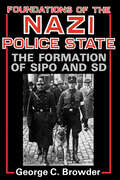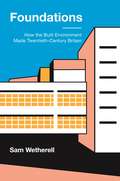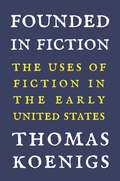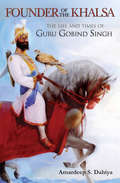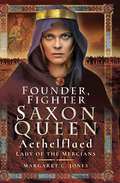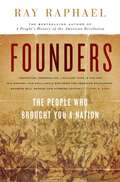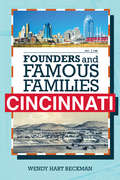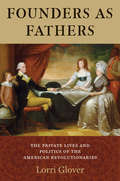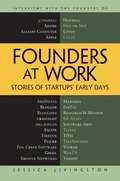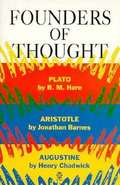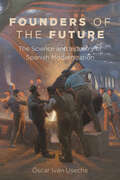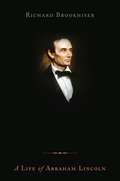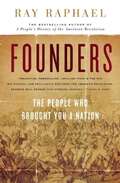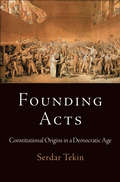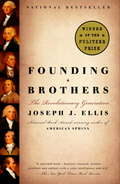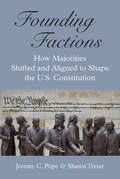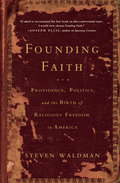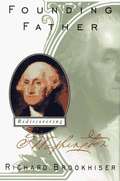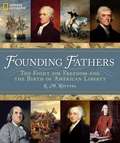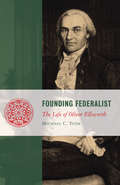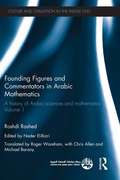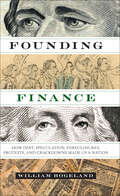- Table View
- List View
Foundations of the Islamic State: Management, Money, and Terror in Iraq, 2005-2010
by Benjamin Bahney Howard J. Shatz Jacob N. Shapiro Jonathan Wallace Patrick K. Ryan Patrick B. Johnston Danielle F. JungDrawing from 140 recently declassified documents, this report comprehensively examines the organization, territorial designs, management, personnel policies, and finances of the Islamic State of Iraq (ISI) and al-Qa'ida in Iraq. Analysis of the Islamic State predecessor groups is more than a historical recounting. It provides significant understanding of how ISI evolved into the present-day Islamic State and how to combat the group.
Foundations of the Nazi Police State: The Formation of Sipo and SD
by George C. BrowderA comprehensive study of the lesser-known organizations that formed the heart of the Nazi police state in World War II Germany.The abbreviation “Nazi,” the acronym “Gestapo,” and the initials “SS” have become resonant elements of our vocabulary. Less known is “SD,” and hardly anyone recognizes the combination “Sipo and SD.” Although Sipo and SD formed the heart of the National Socialist police state, the phrase carries none of the ominous impact that it should.Although no single organization carries full responsibility for the evils of the Third Reich, the SS-police system was the executor of terrorism and “population policy” in the same way the military carried out the Reich’s imperialistic aggression. Within the police state, even the concentration camps could not rival the impact of Sipo and SD. It was the source not only of the “desk murderers” who administered terror and genocide by assigning victims to the camps, but also of the police executives for identification and arrest, and of the command and staff for a major instrument of execution, the Einsatzgruppen.Foundations of the Nazi Police State offers the narrative and analysis of the external struggle that created Sipo and SD. This book is the author’s preface to his discussion of the internal evolution of these organizations in Hitler’s Enforcers: The Gestapo and the SS Security Service in the Nazi Revolution.“A welcome addition to the literature on National Socialist Germany.” —American Historical Review“Sheds new light on Himmler’s role in the complex web of the Nazi police state.” —Publishers Weekly“[The book] makes major changes in our understanding of the structure and functioning of the Nazi police state.” —Canadian Journal of History“This is the first comprehensive study of how the Gestapo and all other detective police came to be united under the Sipo (Security Police) and tied to the SD (The Security Services of the Party and SS).” —Educational Book Review“The work fills an important gap in the literature on the Third Reich.” —TheHistorian
Foundations: How the Built Environment Made Twentieth-Century Britain
by Dr Sam WetherellAn urban history of modern Britain, and how the built environment shaped the nation’s politicsFoundations is a history of twentieth-century Britain told through the rise, fall, and reinvention of six different types of urban space: the industrial estate, shopping precinct, council estate, private flats, shopping mall, and suburban office park. Sam Wetherell shows how these spaces transformed Britain’s politics, economy, and society, helping forge a midcentury developmental state and shaping the rise of neoliberalism after 1980.From the mid-twentieth century, spectacular new types of urban space were created in order to help remake Britain’s economy and society. Government-financed industrial estates laid down infrastructure to entice footloose capitalists to move to depressed regions of the country. Shopping precincts allowed politicians to plan precisely for postwar consumer demand. Public housing modernized domestic life and attempted to create new communities out of erstwhile strangers. In the latter part of the twentieth century many of these spaces were privatized and reimagined as their developmental aims were abandoned. Industrial estates became suburban business parks. State-owned shopping precincts became private shopping malls. The council estate was securitized and enclosed. New types of urban space were imported from American suburbia, and planners and politicians became increasingly skeptical that the built environment could remake society. With the midcentury built environment becoming obsolete, British neoliberalism emerged in tense negotiation with the awkward remains of built spaces that had to be navigated and remade.Taking readers to almost every major British city as well as to places in the United States and Britain’s empire, Foundations highlights how some of the major transformations of twentieth-century British history were forged in the everyday spaces where people lived, worked, and shopped.
Founded in Fiction: The Uses of Fiction in the Early United States
by Thomas KoenigsAn original account of the importance of diverse forms of fiction in the early American republic—one that challenges the &“rise of the novel&” narrativeWhat is the use of fiction? This question preoccupied writers in the early United States, where many cultural authorities insisted that fiction-reading would mislead readers about reality. Founded in Fiction argues that this suspicion made early American writers especially attuned to one of fiction&’s defining but often overlooked features—its fictionality. Thomas Koenigs shows how these writers explored the unique types of speculative knowledge that fiction could create as they sought to harness different varieties of fiction for a range of social and political projects.Spanning the years 1789–1861, Founded in Fiction challenges the &“rise of novel&” narrative that has long dominated the study of American fiction by highlighting how many of the texts that have often been considered the earliest American novels actually defined themselves in contrast to the novel. Their writers developed self-consciously extranovelistic varieties of fiction, as they attempted to reform political discourse, shape women&’s behavior, reconstruct a national past, and advance social criticism. Ambitious in scope, Founded in Fiction features original discussions of a wide range of canonical and lesser-known writers, including Hugh Henry Brackenridge, Royall Tyler, Charles Brockden Brown, Leonora Sansay, Catharine Maria Sedgwick, Edgar Allan Poe, Robert Montgomery Bird, George Lippard, Harriet Beecher Stowe, Frederick Douglass, and Harriet Jacobs.By reframing the history of the novel in the United States as a history of competing varieties of fiction, Founded in Fiction shows how these fictions structured American thinking about issues ranging from national politics to gendered authority to the intimate violence of slavery.
Founder of the Khalsa: The Life and Times of Guru Gobind Singh
by Amardeep S. DahiyaThis book encapsulates the exceptionally eventful and vibrant life of the guru that will provoke thought and debate even in today’s times.Guru Gobind Singh – Founder of the Khalsa; saint; warrior par excellence; poignant poet; philosopher; soulful human being – was the illustrious Tenth Guru of the Sikhs.This extensively researched book goes beyond the established events that broadly include the untimely assassination of Guru Teg Bahadur; Guru Gobind Singh’s coronation; the battles of Bhangani and Nadaun; his stay in Paonta and Anandpur; and the historic creation of the Khalsa. The book talks about other events that sought to widely establish the Khalsa including the battle of Nirmohgarh; the siege and evacuation of Anandpur; the battles of Chamkaur, Khidrana and Muktsar; his Zafarnama to Aurangzeb and subsequent meeting with Bahadur Shah Zafar in Agra. Most importantly, it provides some unknown facts about the anointment of the holy book of the Sikhs – the Guru Granth Sahib as the eternal guiding light. Guru Gobind Singh’s prowess as a warrior of immense distinction is well-recorded, besides his understanding of military strategy and execution; the book brings to light his love for literature, scriptures and languages, his philosophical, judicious and humane thought, and is a tribute to the great saint and seeks to outline the historical life, times and events of Guru Gobind Singh in intricate details.
Founder, Fighter, Saxon Queen: Aethelflaed, Lady of the Mercians
by Margaret C. JonesThe story of the daughter of Alfred the Great, who fought against Viking invaders and ruled a kingdom in the tenth century. Alfred the Great’s daughter defied all expectations of a well-bred Saxon princess. The first Saxon woman ever to rule a kingdom, Aethelflaed, Lady of the Mercians, led her army in battle against Viking invaders. She further broke with convention by arranging for her daughter to succeed her on the throne of Mercia. To protect her people and enable her kingdom in the Midlands to prosper, Aethelflaed rebuilt Chester and Gloucester, and built seven entirely new English towns. In so doing she helped shape our world today. This book brings Aethelflaed’s world to life, from her childhood in time of war to her remarkable work as ruler of Mercia. The final chapter traces her legend, from medieval paintings to novels and contemporary art, illustrating the impact of a legacy that continues to be felt to this day.
Founders
by Ray RaphaelWashington, Franklin, Jefferson, Hamilton, Adams, and Madison-together they are best known as an intimate cadre of daring, brilliant men credited with our nation's founding. But does this group tell the whole story? In his widely praised new history of the roots of American patriotism, celebrated author Ray Raphael expands the historical canvas to reveal an entire generation of patriots who pushed for independence, fought a war, and set the United States on its course-giving us "an evangelizing introduction to the American Revolution" (Booklist) .Called "entertaining yet informative" by Library Journal , Founders brings to life seven historical figures whose stories anchor a sweeping yet intimate history of the Founding Era, from the beginnings of unrest in 1761 through the passage of the Bill of Rights thirty years later. Here we follow the intertwined lives of George Washington and a private soldier in his army. America's richest merchant, who rescued the nation from bankruptcy, goes head to head with a peripatetic revolutionary who incited rebellion in seven states. Rounding out the company is a richly nuanced cast that includes a common village blacksmith, a conservative slave owner with an abolitionist son, and Mercy Otis Warren, the most politically engaged woman of the time. A master narrative with unprecedented historical scope, Founders will forever change our image of this most crucial moment in America's past.
Founders and Famous Families of Cincinnati
by Wendy Hart BeckmanBringing to life the founding families' histories, Founders and Famous Families of Cincinnati shares these intertwined and fascinating tales with readers near and far. This approachable overview of Cincinnati is a charming history of lives lived large - truly the Who's Who (as well as the When and Where) of Cincinnati - that, when considered together, made the Queen City the great place to live and work that it is today. From its very beginnings, Cincinnati offered an enticing combination of welcome and worldly sophistication. At one point, Cincinnati had more native-born residents than any other American city, a testament to the values that attracted and retained its citizens. Cincinnati's familial history is topped off with a sprinkling of the innovations that have impacted the rest of the world, including the first professional baseball team, the first pharmacy college, the first Jewish hospital, the first municipal university, the first concrete skyscraper, the first municipal railroad, and many more.
Founders as Fathers
by Lorri GloverSurprisingly, no previous book has ever explored how family life shaped the political careers of America's great Founding Fathers--men like George Mason, Patrick Henry, George Washington, Thomas Jefferson, and James Madison. In this original and intimate portrait, historian Lorri Glover brings to life the vexing, joyful, arduous, and sometimes tragic experiences of the architects of the American Republic who, while building a nation, were also raising families. The costs and consequences for the families of these Virginia leaders were great, Glover discovers: the Revolution remade family life no less than it reinvented political institutions. She describes the colonial households that nurtured future revolutionaries, follows the development of political and family values during the revolutionary years, and shines new light on the radically transformed world that was inherited by nineteenth-century descendants. Beautifully written and replete with fascinating detail, this groundbreaking book is the first to introduce us to the founders as fathers.
Founders at Work: Stories of Startups' Early Days
by Jessica LivingstonFounders at Work: Stories of Startups' Early Days is a collection of interviews with founders of famous technology companies about what happened in the very earliest days. These people are celebrities now.
Founders of Thought: Plato, Aristotle, Augustine
by Jonathan Barnes Henry Chadwick R. M. HareFounders of Thought offers introductions to three of the most influential intellects of classical antiquity: Plato, whose dialogues form the basis of the study of logic, metaphysics, and moral and political philosophy; Aristotle, polymath, tutor of Alexander the Great and "master of those who know"; and Augustine, the Christian convert who asked God to make him good, "but not yet." Brief, accessible, and written by outstanding scholars, these studies offer readers an introduction to the ideas and achievements of the thinkers whose works are essential to a full understanding of western thought and culture.
Founders of the Future: The Science and Industry of Spanish Modernization (Campos Ibéricos: Bucknell Studies in Iberian Literatures and Cultures)
by Óscar Iván UsecheIn this ambitious new interdisciplinary study, Useche proposes the metaphor of the social foundry to parse how industrialization informed and shaped cultural and national discourses in late nineteenth- and early twentieth-century Spain. Across a variety of texts, Spanish writers, scientists, educators, and politicians appropriated the new economies of industrial production—particularly its emphasis on the human capacity to transform reality through energy and work—to produce new conceptual frameworks that changed their vision of the future. These influences soon appeared in plans to enhance the nation’s productivity, justify systems of class stratification and labor exploitation, or suggest state organizational improvements. This fresh look at canonical writers such as Emilia Pardo Bazán, Concha Espina, Benito Pérez Galdós, Vicente Blasco Ibáñez, and José Echegaray as well as lesser known authors offers close readings of their work as it reflected the complexity of Spain’s process of modernization.
Founders' Son: A Life of Abraham Lincoln
by Richard BrookhiserAbraham Lincoln grew up in the long shadow of the Founding Fathers. Seeking an intellectual and emotional replacement for his own taciturn father, Lincoln turned to the great men of the founding#151;Washington, Paine, Jefferson#151;and their great documents#151;the Declaration of Independence, the Constitution#151;for knowledge, guidance, inspiration, and purpose. Out of the power vacuum created by their passing, Lincoln emerged from among his peers as the true inheritor of the Founders’ mantle, bringing their vision to bear on the Civil War and the question of slavery. In Founders’ Son, celebrated historian Richard Brookhiser presents a compelling new biography of Abraham Lincoln that highlights his lifelong struggle to carry on the work of the Founding Fathers. Following Lincoln from his humble origins in Kentucky to his assassination in Washington, D. C. , Brookhiser shows us every side of the man: laborer, lawyer, congressman, president; storyteller, wit, lover of ribald jokes; depressive, poet, friend, visionary. And he shows that despite his many roles and his varied life, Lincoln returned time and time again to the Founders. They were rhetorical and political touchstones, the basis of his interest in politics, and the lodestars guiding him as he navigated first Illinois politics and then the national scene. But their legacy with not sufficient. As the Civil War lengthened and the casualties mounted Lincoln wrestled with one more paternal figure#151;God the Father#151;to explain to himself, and to the nation, why ending slavery had come at such a terrible price. Bridging the rich and tumultuous period from the founding of the United States to the Civil War, Founders’ Son is unlike any Lincoln biography to date. Penetrating in its insight, elegant in its prose, and gripping in its vivid recreation of Lincoln’s roving mind at work, this book allows us to think anew about the first hundred years of American history, and shows how we can, like Lincoln, apply the legacy of the Founding Fathers to our times.
Founders: The People Who Brought You a Nation
by Ray RaphaelRaphael provides a history of the work of seven forgotten founders of America, among the many Revolutionary Americans who contributed to the founding of the country: army private Joseph Plumb Martin; the wealthy merchant Robert Morris, who helped finance the nation; small-town blacksmith Timothy Bigelow, who helped engineer the first overthrow of British authority; conservative Henry Laurens; doctor Thomas Young; and political correspondent Mercy Otis Warren. He traces the lives and work of these individuals who aided in the revolution from 1761 to the passage of the Bill of Rights 30 years later. He focuses on these themes: the ideal of popular sovereignty, inclusion and exclusion, exchanges of power, efforts to constrain authority, and expansion of the country. Raphael has been a high school and college teacher and is the author of several books.
Founding Acts: Constitutional Origins in a Democratic Age
by Serdar TekinAll democratic constitutions feature "the people" as their author and ultimate source of legitimacy. They claim to embody the political form that citizens are in some sense supposed to have given themselves. But in what sense, exactly? When does a constitution really or genuinely speak for the people? Such questions are especially pertinent to our present condition, where the voice of "the people" turns out to be irrevocably fragmented, and people themselves want to speak and be heard in their own voices.Founding Acts explores the relationship between constitutional claims of popular sovereignty and the practice of constitution-making in our pluralistic age. Serdar Tekin argues that the process of making a constitution, or its pedigree, is as morally and politically significant as its content. Consequently, democratic constitution-making is not only about making a democratic constitution but also about making it, as much as possible, democratically.Tekin develops two overarching arguments in support of this claim. First, citizen participation in the process of constitution-making is essential to the democratic legitimacy of a new constitution. Second, collective action, that is, the political experience of constructing public life together, is what binds diverse people into a democratic peoplehood. Bringing into dialogue a wide range of canonical and contemporary thinkers, Tekin examines historical realities extending from revolutionary America and France to contemporary South Africa and Germany.
Founding Brothers: The Revolutionary Generation (Pulitzer Prize Winner)
by Joseph J. EllisPULITZER PRIZE WINNER • NATIONAL BESTSELLER • A landmark work of history explores how a group of greatly gifted but deeply flawed individuals—Hamilton, Burr, Jefferson, Franklin, Washington, Adams, and Madison—confronted the overwhelming challenges before them to set the course for our nation.&“A splendid book—humane, learned, written with flair and radiant with a calm intelligence and wit.&” —The New York Times Book ReviewThe United States was more a fragile hope than a reality in 1790. During the decade that followed, the Founding Fathers—re-examined here as Founding Brothers—combined the ideals of the Declaration of Independence with the content of the Constitution to create the practical workings of our government. Through an analysis of six fascinating episodes—Hamilton and Burr&’s deadly duel, Washington&’s precedent-setting Farewell Address, Adams&’ administration and political partnership with his wife, the debate about where to place the capital, Franklin&’s attempt to force Congress to confront the issue of slavery and Madison&’s attempts to block him, and Jefferson and Adams&’ famous correspondence—Founding Brothers brings to life the vital issues and personalities from the most important decade in our nation&’s history.
Founding Factions: How Majorities Shifted and Aligned to Shape the U.S. Constitution
by Jeremy C Pope Shawn TreierThe fundamental importance of the 1787 Constitutional Convention continues to affect contemporary politics. The Constitution defines the structure and limits of the American system of government, and it organizes contemporary debates about policy and legal issues—debates that explicitly invoke the intentions and actions of those delegates to the Convention. Virtually all scholarship emphasizes the importance of compromise between key actors or factions at the Convention. In truth, the deep structure of voting at the Convention remains somewhat murky because the traditional stories are incomplete. There were three key factions at the Convention, not two. The alliance of the core reformers with the slave interests helped change representation and make a stronger national government. When it came time to create a strong executive, a group of small state delegates provided the crucial votes. Traditional accounts gloss over the complicated coalition politics that produced these important compromises, while this book shows the specific voting alignments. It is true that the delegates came with common purposes, but they were divided by both interests and ideas into three crosscutting factions. There was no persistent dominant coalition of reformers or nationalists; rather, there was a series of minority factions allying with one another on the major issues to fashion the compromise. Founding Factions helps us understand the nature of shifting majorities and how they created the American government.
Founding Faith
by Steven WaldmanWith refreshing objectivity, beliefnet. com editor in chief Waldman narrates the real story of how America's Founding Fathers forged a new approach to religious liberty--a revolutionary formula that promoted faith by leaving it alone.
Founding Father: Rediscovering George Washington
by Richard BrookhiserIn this thought-provoking look at George Washington as soldier and statesman, Richard Brookhiser traces the astonishing achievements of Washington's career and illuminates how his character and his values shaped the beginnings of American politics.
Founding Fathers: The Fight for Freedom and the Birth of American Liberty
by Jack N. Rakove K. M. KostyalKostyal tells the story of the great American heroes who created the Declaration of Independence, fought the American Revolution, shaped the US Constitution--and changed the world. The era's dramatic events, from the riotous streets in Boston to the unlikely victory at Saratoga, are punctuated with lavishly illustrated biographies of the key founders--Alexander Hamilton, John Adams, Ben Franklin, Thomas Paine, Thomas Jefferson, George Washington, and James Madison--who shaped the very idea of America. An introduction and ten expertly-rendered National Geographic maps round out this ideal gift for history buff and student alike. Filled with beautiful illustrations, maps, and inspired accounts from the men and women who made America, Founding Fathers brings the birth of the new nation to light.
Founding Federalist: The Life of Oliver Ellsworth (Lives Of The Founders Ser.)
by Michael TothIn Founding Federalist, Michael C. Toth provides an in-depth look at the life and work of Oliver Ellsworth, a largely forgotten but eminently important Founding Father.The American Founding was the work of visionaries and revolutionaries. But amid the celebrated luminaries, the historic transformations, the heroic acts, and unforgettable discourses were practical politicians, the consensus builders who made the system work. Oliver Ellsworth--Framer, senator, chief justice, diplomat--was such a leader.Founding Federalist brings to life a figure whose contributions shape American political life even today. Vividly capturing the pivotal debates at Philadelphia in the summer of 1787, Toth shows how Ellsworth was a vital force in shaping the Constitution as a Federalist document, one that did not extinguish the role of the states even as it recognized the need for national institutions. The author illuminates what Ellsworth and other Founders understood to be the meaning of the new constitutional order--a topic highly relevant to twenty-first-century debates about the role of government. Toth, an attorney, also brilliantly analyzes Ellsworth's most important legislative achievement: the creation of the U.S. federal court system.With this insightful new biography, Michael Toth has reclaimed a figure who made crucial contributions to a lasting creation: a federal republic.
Founding Feuds: The Rivalries, Clashes, and Conflicts That Forged a Nation
by Paul AronThe Founding Fathers have been hailed for centuries as shining examples of men who put aside their own agendas to found a nation. But behind the scenes, there were more petty fights and fraught relationships than signatures on the Declaration of Independence. From the violent brawl between Roger Griswold and Matthew Lyon in the halls of Congress, to George Washington's battle against his slave Harry Washington, these less-discussed clashes bring to light the unpredictable and volatile nature of a constantly changing nation. Additionally, this gripping narrative delves deeper into the famous feuds, such as the fatal duel of Alexander Hamilton and Aaron Burr, and the many rivalries of Thomas Jefferson (which were as often personal as political.)America's great forbearers fought with each other as bitterly as our politicians do today. Founding Feuds reveals the true natures of the Founding Fathers and how their infighting shaped our nation as much as their cooperation, in fact sometimes even for the better.
Founding Figures and Commentators in Arabic Mathematics: A History of Arabic Sciences and Mathematics Volume 1 (Culture and Civilization in the Middle East)
by Roshdi RashedIn this unique insight into the history and philosophy of mathematics and science in the mediaeval Arab world, the eminent scholar Roshdi Rashed illuminates the various historical, textual and epistemic threads that underpinned the history of Arabic mathematical and scientific knowledge up to the seventeenth century. The first of five wide-ranging and comprehensive volumes, this book provides a detailed exploration of Arabic mathematics and sciences in the ninth and tenth centuries. Extensive and detailed analyses and annotations support a number of key Arabic texts, which are translated here into English for the first time. In this volume Rashed focuses on the traditions of celebrated polymaths from the ninth and tenth centuries ‘School of Baghdad’ - such as the Banū Mūsā, Thābit ibn Qurra, Ibrāhīm ibn Sinān, Abū Ja´far al-Khāzin, Abū Sahl Wayjan ibn Rustām al-Qūhī - and eleventh-century Andalusian mathematicians like Abū al-Qāsim ibn al-Samh, and al-Mu’taman ibn Hūd. The Archimedean-Apollonian traditions of these polymaths are thematically explored to illustrate the historical and epistemological development of ‘infinitesimal mathematics’ as it became more clearly articulated in the eleventh-century influential legacy of al-Hasan ibn al-Haytham (‘Alhazen’). Contributing to a more informed and balanced understanding of the internal currents of the history of mathematics and the exact sciences in Islam, and of its adaptive interpretation and assimilation in the European context, this fundamental text will appeal to historians of ideas, epistemologists, mathematicians at the most advanced levels of research.
Founding Finance: How Debt, Speculation, Foreclosures, Protests, and Crackdowns Made Us a Nation (Discovering America)
by William HogelandThe author of The Whiskey Rebellion “dig[s] beneath history’s surface and note[s] both the populist and anti-populist dimensions of the nation’s founding” (Library Journal).Recent movements such as the Tea Party and anti-tax “constitutional conservatism” lay claim to the finance and taxation ideas of America’s founders, but how much do we really know about the dramatic clashes over finance and economics that marked the founding of America? Dissenting from both right-wing claims and certain liberal preconceptions, Founding Finance brings to life the violent conflicts over economics, class, and finance that played directly, and in many ways ironically, into the hardball politics of forming the nation and ratifying the Constitution—conflicts that still continue to affect our politics, legislation, and debate today.Mixing lively narrative with fresh views of America’s founders, William Hogeland offers a new perspective on America’s economic infancy: foreclosure crises that make our current one look mild; investment bubbles in land and securities that drove rich men to high-risk borrowing and mad displays of ostentation before dropping them into debtors’ prisons; depressions longer and deeper than the great one of the twentieth century; crony mercantilism, war profiteering, and government corruption that undermine any nostalgia for a virtuous early republic; and predatory lending of scarce cash at exorbitant, unregulated rates, which forced people into bankruptcy, landlessness, and working in the factories and on the commercial farms of their creditors. This story exposes and corrects a perpetual historical denial—by movements across the political spectrum—of America’s all-important founding economic clashes, a denial that weakens and cheapens public discourse on American finance just when we need it most.
Founding Finance: How Debt, Speculation, Foreclosures, Protests, and Crackdowns Made Us a Nation (Discovering America)
by William HogelandRecent movements such as the Tea Party and anti-tax “constitutional conservatism” lay claim to the finance and taxation ideas of America’s founders, but how much do we really know about the dramatic clashes over finance and economics that marked the founding of America? Dissenting from both right-wing claims and certain liberal preconceptions, Founding Finance brings to life the violent conflicts over economics, class, and finance that played directly, and in many ways ironically, into the hardball politics of forming the nation and ratifying the Constitution—conflicts that still continue to affect our politics, legislation, and debate today. Mixing lively narrative with fresh views of America’s founders, William Hogeland offers a new perspective on America’s economic infancy: foreclosure crises that make our current one look mild; investment bubbles in land and securities that drove rich men to high-risk borrowing and mad displays of ostentation before dropping them into debtors’ prisons; depressions longer and deeper than the great one of the twentieth century; crony mercantilism, war profiteering, and government corruption that undermine any nostalgia for a virtuous early republic; and predatory lending of scarce cash at exorbitant, unregulated rates, which forced people into bankruptcy, landlessness, and working in the factories and on the commercial farms of their creditors. This story exposes and corrects a perpetual historical denial—by movements across the political spectrum—of America’s all-important founding economic clashes, a denial that weakens and cheapens public discourse on American finance just when we need it most.

